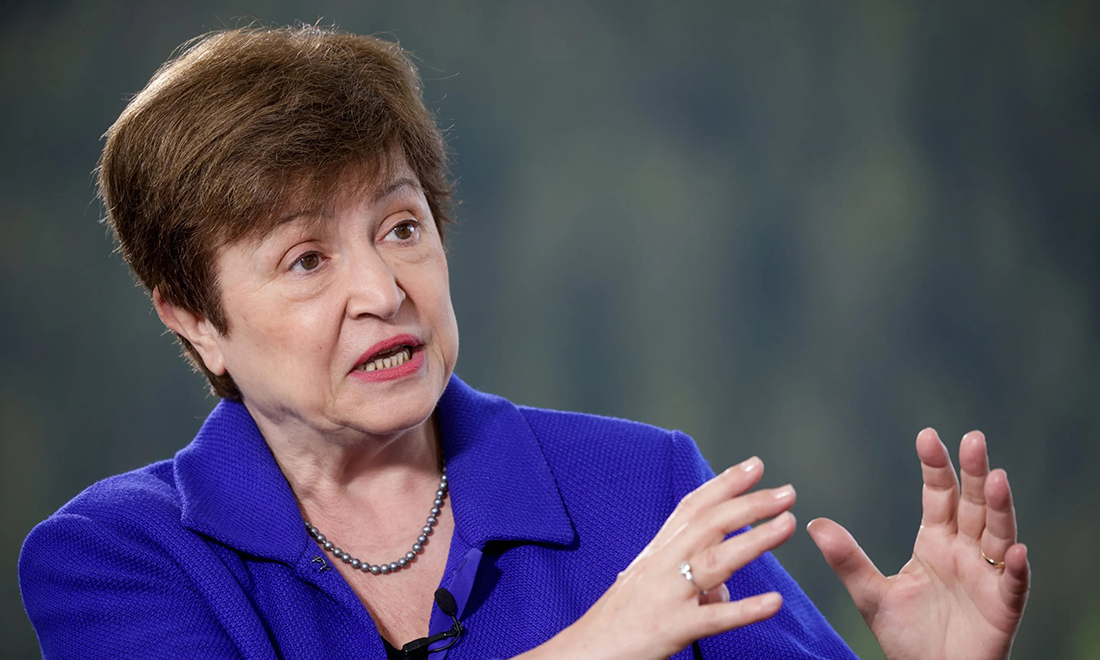
国际货币基金组织(International Monetary Fund)的总裁认为,事实证明,通胀比预期更加“顽固”,世界各国的央行行长需要“顽抗到底”。
克里斯塔利娜·格奥尔基耶娃在9月14日与法国央行行长弗朗索瓦·维勒鲁瓦·德·加豪的一次活动中表示,通胀“比我们想象的更为广泛”。
格奥尔基耶娃补充称,经济学家在2021年10月的看法更乐观,原因是经济高速增长和新冠疫苗的接种。但是,她说:“在奥密克戎来袭、俄乌冲突爆发以及今年夏天气候影响农业生产时,事实证明我们的看法是错误的。”
国际货币基金组织的总裁承认判断失误,这与其他经济学家和央行行长如今对通胀的看法不谋而合。他们过去错误地认为通胀是一种暂时现象。美联储(U.S. Federal Reserve)的主席杰罗姆·鲍威尔和美国财政部的部长珍妮特·耶伦都预测,在2021年的大部分时间里,通货膨胀将是“暂时的”,但他们在去年年底放弃了这一说法。耶伦今年早些时候在接受美国有线电视新闻网(CNN)采访时表示,她“对通胀走势的判断出现失误”。
格奥尔基耶娃本人在今年5月告诉路透社(Reuters),这波奥密克戎疫情让她相信通胀不会是暂时现象。
“顽固”的通货膨胀
经济学家预计,在美国、英国和其他国家大幅加息以及天然气价格下降之后,通货膨胀可能会在夏季开始降温。然而,通胀持续高于预期,这表明物价上涨已经扩大到整个经济领域。
9月13日,美国劳工部(U.S. Department of Labor)报告称,物价环比上涨0.1%。食品、房租和其他商品价格上涨抵消了汽油价格下跌。扣除汽油和食品价格的核心CPI环比上涨0.6%。
欧盟(European Union)报告称,8月通胀同比上涨9.1%,主要受能源价格同比上涨38.3%的影响。欧洲国家今年冬天可能需要对能源供应实行配给。
9月14日,英国公布8月通胀同比上涨9.9%,较上月公布的10.1%的同比增幅略有下降。英国国家统计局(Office for National Statistics)表示,通胀略有降温是由于天然气价格下跌,而英国食品价格则继续上涨。
央行行长要顽抗到底
在高于预期的通胀报告发布后,经济学家认为美联储于9月会议宣布大幅加息的可能性增大,一些分析师目前预测美联储会加息整整一个百分点。9月13日,投资者对美国通胀消息感到悲观,引发了自2020年6月以来前所未有的市场抛售。9月14日,美国股市小幅回升,标准普尔500指数(S&P 500)微涨0.3%。
欧洲央行(European Central Bank)于9月8日将利率上调75个基点,并承诺将进一步加息以对抗通胀。本月早些时候,加拿大和澳大利亚的央行也分别加息75个基点和50个基点。
经济学家还预测,继8月加息50个基点后,英国本周将加息50个基点。
国际货币基金组织的总裁格奥尔基耶娃在9月14日表示,“如果各国央行做好本职工作”,通胀可能在明年前回落。然而,她也担心,“如果财政政策针对性不强”,政府实施的刺激措施可能会对央行遏制物价上涨的努力产生不利影响。(财富中文网)
译者:中慧言-王芳
国际货币基金组织(International Monetary Fund)的总裁认为,事实证明,通胀比预期更加“顽固”,世界各国的央行行长需要“顽抗到底”。
克里斯塔利娜·格奥尔基耶娃在9月14日与法国央行行长弗朗索瓦·维勒鲁瓦·德·加豪的一次活动中表示,通胀“比我们想象的更为广泛”。
格奥尔基耶娃补充称,经济学家在2021年10月的看法更乐观,原因是经济高速增长和新冠疫苗的接种。但是,她说:“在奥密克戎来袭、俄乌冲突爆发以及今年夏天气候影响农业生产时,事实证明我们的看法是错误的。”
国际货币基金组织的总裁承认判断失误,这与其他经济学家和央行行长如今对通胀的看法不谋而合。他们过去错误地认为通胀是一种暂时现象。美联储(U.S. Federal Reserve)的主席杰罗姆·鲍威尔和美国财政部的部长珍妮特·耶伦都预测,在2021年的大部分时间里,通货膨胀将是“暂时的”,但他们在去年年底放弃了这一说法。耶伦今年早些时候在接受美国有线电视新闻网(CNN)采访时表示,她“对通胀走势的判断出现失误”。
格奥尔基耶娃本人在今年5月告诉路透社(Reuters),这波奥密克戎疫情让她相信通胀不会是暂时现象。
“顽固”的通货膨胀
经济学家预计,在美国、英国和其他国家大幅加息以及天然气价格下降之后,通货膨胀可能会在夏季开始降温。然而,通胀持续高于预期,这表明物价上涨已经扩大到整个经济领域。
9月13日,美国劳工部(U.S. Department of Labor)报告称,物价环比上涨0.1%。食品、房租和其他商品价格上涨抵消了汽油价格下跌。扣除汽油和食品价格的核心CPI环比上涨0.6%。
欧盟(European Union)报告称,8月通胀同比上涨9.1%,主要受能源价格同比上涨38.3%的影响。欧洲国家今年冬天可能需要对能源供应实行配给。
9月14日,英国公布8月通胀同比上涨9.9%,较上月公布的10.1%的同比增幅略有下降。英国国家统计局(Office for National Statistics)表示,通胀略有降温是由于天然气价格下跌,而英国食品价格则继续上涨。
央行行长要顽抗到底
在高于预期的通胀报告发布后,经济学家认为美联储于9月会议宣布大幅加息的可能性增大,一些分析师目前预测美联储会加息整整一个百分点。9月13日,投资者对美国通胀消息感到悲观,引发了自2020年6月以来前所未有的市场抛售。9月14日,美国股市小幅回升,标准普尔500指数(S&P 500)微涨0.3%。
欧洲央行(European Central Bank)于9月8日将利率上调75个基点,并承诺将进一步加息以对抗通胀。本月早些时候,加拿大和澳大利亚的央行也分别加息75个基点和50个基点。
经济学家还预测,继8月加息50个基点后,英国本周将加息50个基点。
国际货币基金组织的总裁格奥尔基耶娃在9月14日表示,“如果各国央行做好本职工作”,通胀可能在明年前回落。然而,她也担心,“如果财政政策针对性不强”,政府实施的刺激措施可能会对央行遏制物价上涨的努力产生不利影响。(财富中文网)
译者:中慧言-王芳
The director of the International Monetary Fund thinks that inflation has proved more “stubborn” than expected, and that the world’s central bankers need to be just “as stubborn in fighting it.”
Inflation “is more broad-based than we thought it would be,” Kristalina Georgieva said during a September 14 event with François Villeroy de Galhau, France’s top central banker.
Georgieva added that economists were more upbeat last October, pointing to high economic growth and COVID vaccinations. But, she said, “we were proven wrong: wrong when Omicron hit, wrong when Russia invaded Ukraine, wrong when during this summer, climate shocks [affected] agricultural productivity,” she explained.
The IMF chief’s mea culpa matches similar admissions from other economists and central bankers that they were wrong about inflation being a passing phenomenon. Both U.S. Federal Reserve Chair Jerome Powell and Secretary of the Treasury Janet Yellen predicted inflation would be “transitory” for much of 2021, before retiring the phrase late last year. Yellen told CNN earlier this year that she “was wrong about the path inflation would take.”
Georgieva herself told Reuters in May that the Omicron wave convinced her that inflation would not be a temporary phenomenon.
“Stubborn” inflation
Economists predicted that inflation might start to cool in the summer, following aggressive rate hikes in the U.S., the U.K., and elsewhere and a fall in gas prices. However, continued higher-than-expected inflation shows that prices are rising across a broad swath of the economy.
On September 13, the U.S. Department of Labor reported that prices increased by 0.1% month on month. An increase in the cost of food, rent, and other goods offset a fall in gas prices. Core CPI, which excludes gas and food prices, increased by 0.6% from the previous month.
The European Union reported 9.1% inflation year on year for August, primarily driven by a whopping 38.3% year on year increase in the price of energy. European countries are facing the prospect of energy rationing heading into the winter.
On September 14, the U.K. reported 9.9% inflation year on year for August, a slight decrease from the 10.1% year-on-year increase reported the previous month. The Office for National Statistics said the slight cooling of inflation was due to a fall in gas prices, even as U.K. food prices continued to rise.
“Stubborn” central bankers
After the higher-than-expected inflation report, economists see a greater chance that the U.S. Federal Reserve will enact a steep interest rate hike at its September meeting, with some analysts now predicting a full percentage point increase. Investors took the U.S. inflation news badly on September 13, sparking a market selloff not seen since June 2020. Stocks recovered slightly on September 14, with the S&P 500 inching up 0.3%.
The European Central Bank raised its interest rates by 75 basis points on Sept. 8, and pledged to raise them even further to battle inflation. Central banks in Canada and Australia also raised interest rates, by 75 and 50 basis points respectively, earlier this month.
Economists also predict that the U.K. will raise interest rates by 50 basis points this week, following a 50 basis point hike in August.
IMF director Georgieva said on September 14 that “if central banks do their job well,” inflation might recede by next year. Yet she also shared concerns that “if fiscal policy is not targeted sufficiently,” government stimulus might work against central banks’ drive to combat rising prices.






